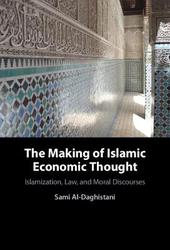
|
The Making of Islamic Economic Thought: Islamization, Law, and Moral Discourses
Hardback
Main Details
| Title |
The Making of Islamic Economic Thought: Islamization, Law, and Moral Discourses
|
| Authors and Contributors |
By (author) Sami Al-Daghistani
|
| Physical Properties |
| Format:Hardback | | Pages:324 | | Dimensions(mm): Height 235,Width 157 |
|
| Category/Genre | Economics
Economic theory and philosophy |
|---|
| ISBN/Barcode |
9781108845755
|
| Classifications | Dewey:297.273 |
|---|
| Audience | | Professional & Vocational | |
|---|
| Illustrations |
Worked examples or Exercises
|
|
Publishing Details |
| Publisher |
Cambridge University Press
|
| Imprint |
Cambridge University Press
|
| Publication Date |
6 January 2022 |
| Publication Country |
United Kingdom
|
Description
Interrogating the development and conceptual framework of economic thought in the Islamic tradition pertaining to ethical, philosophical, and theological ideas, this book provides a critique of modern Islamic economics as a hybrid economic system. From the outset, Sami Al-Daghistani is concerned with the polyvalent methodology of studying the phenomenon of Islamic economic thought as a human science in that it nurtures a complex plentitude of meanings and interpretations associated with the moral self. By studying legal scholars, theologians, and Sufis in the classical period, Al-Daghistani looks at economic thought in the context of Shari'a's moral law. Alongside critiquing modern developments of Islamic economics, he puts forward an idea for a plural epistemology of Islam's moral economy, which advocates for a multifaceted hermeneutical reading of the subject in light of a moral law, embedded in a particular cosmology of human relationality, metaphysical intelligibility, and economic subjectivity.
Author Biography
Sami Al-Daghistani is a Postdoctoral Fellow at the Norwegian School of Theology, Religion and Society in Oslo, an Associate Faculty Member at the Brooklyn Institute for Social Research in New York, and a Research Scholar at the Middle East Institute at Columbia University. He is the author of Ethical Teachings of Abu Hamid al-Ghazali: Economics of Happiness (2021) and translator to Slovenian of Ibn Tufayl's Hay ibn Yaqzan (2016) and Ibn Battuta's Rihla (2017).
Reviews'Sami Al-Daghistani breaks new ground in this remarkable book addressing the crucial role of moral cosmology in Islamic economic theory and practice. The breadth in this work is extraordinary, bringing many major pre-modern and modern Muslim scholars into conversation with western economic thought. A highly rewarding read for anyone interested in 'holistic,' conventional, or Islamic economics.' Waleed El-Ansary, Xavier University 'Sami Al-Daghistani provides a concise, well written, history of Islamic economic thought. The contribution of leading scholars from South Asia is highlighted, including Mawdudi who had a vision of how an Islamic society might function. Contemporary advances have resulted in the entrenchment of modernity, with Islamic economics being forward rather than backward looking.' Rodney Wilson, Durham University 'To the prodigious scholarship on modern political Islam, Sami Al-Daghistani adds an original focus: the economic ideas of the founding thinkers of this political movement, which is too often misconstrued as a return to premodern tradition. This is an indispensable study for scholars of Islamism.' Aamir R. Mufti, Professor of Comparative Literature, University of California, Los Angeles 'This book offers an authoritative analysis of the intellectual history of Islamic economic thought. Al-Daghistani draws on a wide range of historical and contemporary sources to provide a balanced and accessible synthesis of the diverse threads of Muslim intellectual discourses on moral economy. His treatment of the classic scholarly texts is both rigorous and deep. It is a major contribution to the field, and a must-read for all those interested in the evolution of scholarly debates on economy, politics, and law in Muslim societies' Adeel Malik, Globe Fellow in Economies of Muslim Societies and Associate Professor of Development Economics, University of Oxford
|